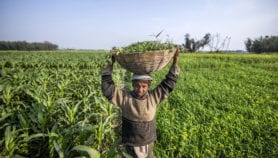Send to a friend
The details you provide on this page will not be used to send unsolicited email, and will not be sold to a 3rd party. See privacy policy.
A gene shown to determine how well plants conserve water could help scientists develop drought-resistant crops, say Australian researchers.
Josette Masle and colleagues at the Australian National University isolated a gene that helps a plant called Arabidopsis minimise water loss as it grows. Their work was published online by Nature on 10 July.
The gene, called 'erecta', determines how many pores the plant has on its leaves. Plants use these pores to take in carbon dioxide, but lose water through them whenever they are open.
"There is a trade-off: gaining carbon dioxide means losing water," explains Masle.
As well as determining the density of pores on the plants' leaves, erecta also helps determine how efficient the cells beneath the pores are at converting carbon dioxide into sugars plants use for growth.
It is the first gene shown to affect both processes.
Masle's team found that by changing the structure of erecta they could create plants with a different balance in the trade-off between losing water and gaining carbon dioxide.
Knowing this means researchers could help crops, such as rice and wheat, be more 'economical' with their water, by giving them a version of erecta that strikes the right balance for the environment they grow in.
Already, the team has found genetic sequences similar to erecta in rice and wheat. The crops could be modified using either conventional breeding methods or modern genetic engineering.
This is likely to become increasingly important as climate change leads to drier conditions in many parts of the world.
The research offers the potential to increase yields both in areas already cultivated and on land previously too dry to farm.
Boosting plants' ability to deal with insufficient water might also enhance their ability to overcome other challenges like extreme salt levels, Masle told SciDev.Net.
Better use of water is one way of combating drought, but other methods include developing plants with a more extensive root system or the ability to retain more water by accumulating dissolved salts.
Link to abstract of paper in Nature
Reference: Nature doi:10.1038/nature03835
Read more about GM crops and climate change in SciDev.Net's GM crops and climate change dossiers.













